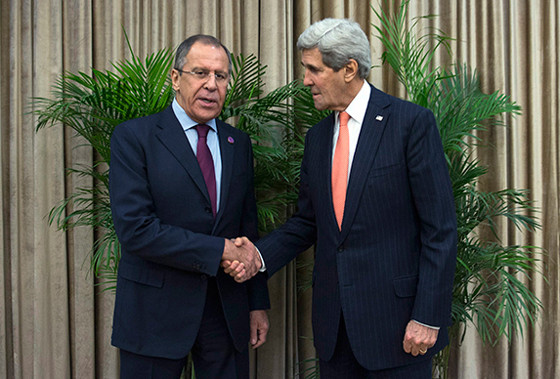Are Russia and the US really changing their attitudes about the Ukraine crisis?
(Baonghean) - While Russia did not recognize the election results in the two regions of Donetsk and Luhansk in Eastern Ukraine as promised, on the sidelines of the 2014 Asia-Pacific Economic Cooperation (APEC) Summit taking place in Beijing (China), the foreign ministers of Russia and the United States agreed to exchange information about the situation in Ukraine. Do these actions reveal the nature of the current crisis in Ukraine?
 |
| Russian Foreign Minister Sergei Lavrov meets with US Secretary of State John Kerry on the sidelines of the 2014 Asia-Pacific Economic Cooperation Summit. Source: RT |
| RELATED NEWS |
|---|
Many big questions arise after these moves: why did Russia change its attitude towards Eastern Ukraine? Are Russia and the US willing to initially have a unified view on the situation in Ukraine? Is the Ukraine crisis about to take a new turn?
First of all, on the Russian side, in his statement, Russian presidential aide Yuri Ushakov affirmed that: “Russia’s official position is expressed in the short but concise statement of the Ministry of Foreign Affairs of the Russian Federation on the election results. Here we use the word ‘respect’”. The first reason, according to analysts, is that Russia deliberately acted like that, because this is a fairly safe approach in the current context. Because Russia does not want to break the ceasefire agreement in Minsk that was so hard to achieve. And Russia certainly does not want to let the war break out, making the situation even more chaotic.
Another reason is that facing the strict sanctions of the US and Europe, especially the ban on agricultural imports from the EU, Russia has also begun to struggle and does not want the situation to worsen. The argument that Russia gives is that both Donetsk and Luhansk cannot meet the requirements of an independent state, such as having no borders, no state institutions... This is both in accordance with international law, "pleasing" Eastern Ukraine and also cannot make the West angry enough to increase sanctions further. Because just on November 6, the US and Europe announced that they are considering increasing the possibility of economic sanctions against Russia.
Meanwhile, on the Western side, there is not much reason for the US and European countries to further strain relations with Russia regarding the Ukraine crisis. The US - a country that has always put pressure on its European allies on the Ukraine issue - is also facing many problems. The midterm congressional elections with the victory of the Republican Party are making it difficult for President Obama to take any domestic and foreign steps. Pressure from the fight against the Islamic State (IS) in Iraq and Syria also makes it difficult for Mr. Obama to get bogged down further in the Ukraine crisis.
Therefore, the US government is probably carefully considering whether to pursue the Ukraine issue to the end or stop in a “draw”. And of course, when the US is hesitant, European countries will not be foolish enough to step in, because Europe is the biggest loser on the Ukrainian chessboard. The context of the public debt crisis, the issues of regional division and the internal conflicts within countries such as the UK, Spain, Italy, etc. are all making European leaders worried. Is it time for geopolitical calculations between the parties to be put on hold?
This question is not easy to answer. The difficult situation of each side is forcing countries to make concessions, but whether those concessions are substantive is another matter. The reality of the situation in the eastern provinces of Ukraine these days says it all. On November 9, fighting in this area broke out again with many artillery exchanges between government troops and opposition forces. This is the most intense fighting between the two sides since a fragile ceasefire agreement was signed more than 2 months ago. Recently, the Special Monitoring Mission to Ukraine (SMM) announced that it had observed 2 convoys of armored vehicles carrying unmarked artillery shells entering Donetsk, the stronghold of the separatists in the East.
Meanwhile, the conflicts and calculations of Russia, the US and Ukraine are not easy to calm down and disappear. Russia certainly will not leave alone a pro-Western neighbor like Ukraine - in the future it may be the location of NATO military bases. Meanwhile, the US is also not easy to let Russia "outsmart" and lose points with its European allies in the Ukraine brainstorming. Another problem is that currently, many factions in Kiev are the ones who want to steer the East towards war, not towards reconciliation or peace.
According to analysts, when the East stabilizes, the Kiev government will no longer receive aid from the US and Europe. The country's empty treasury will be in danger as the economy declines and its huge gas debt to Russia gradually comes due. Moreover, the new pro-Western government of Ukraine will no longer have any excuse to carry out the "anti-Russian" political goals in its upcoming strategy. For such reasons, the Ukraine problem is indeed still far from over, and the recent positive diplomatic moves between Russia and the US will only be temporary rhetoric. Certainly, Ukraine will still have a long way to go to reach stability and peace.
Phuong Hoa






